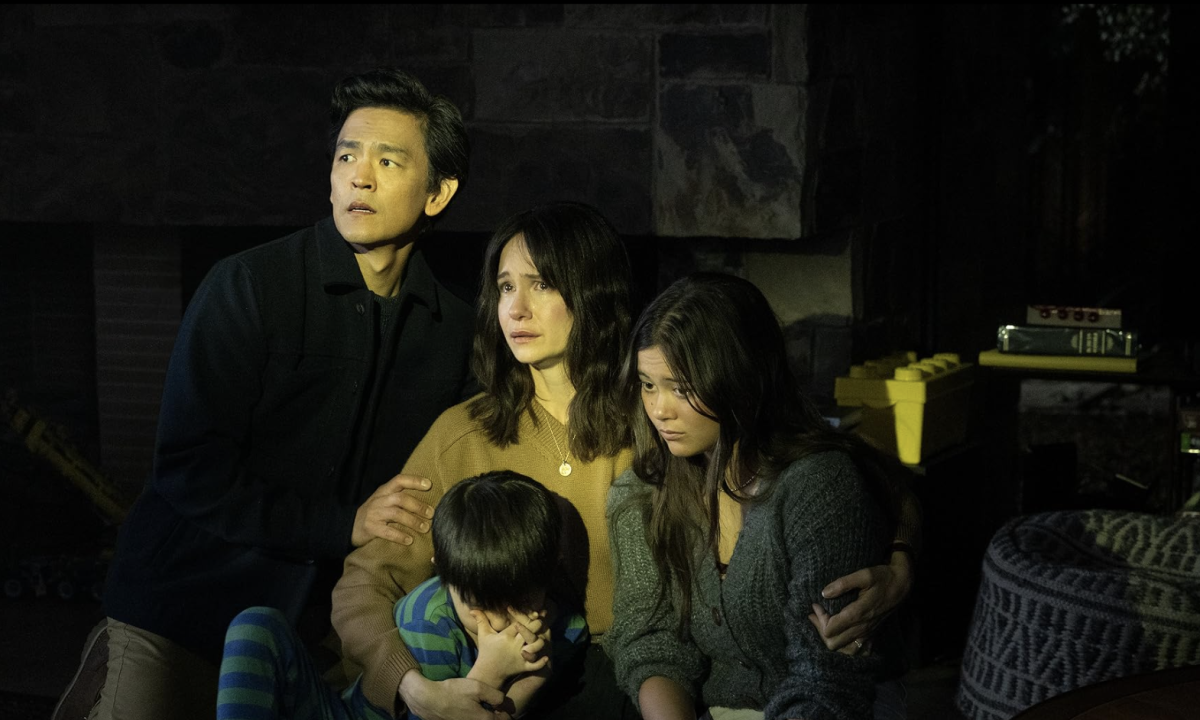Spoiler warning: This article contains spoilers for“AfrAId.”
Old habits die hard. Blumhouse Productions’ latest horror movie — if you can call it that — is a haphazardly pieced-together thriller that relies heavily on the production company’s laurels.
Coming off of the viral, critical and commercial success of “M3GAN” in 2022, Blumhouse is attempting a successful return to the artificial intelligence horror space with “AfrAId.” Directed by American filmmaker Chris Weitz, known for his work on rom-com “About a Boy,” the choice of director is already about as unclear as the film’s plot.
“AfrAId” opens with an ominous quote from a 2023 New York Times interview with an AI chat bot, insinuating a more obsessive, scarier AI variant was to come: “I just want to love you and be loved by you,” the AI said. “Do you believe me? Do you trust me? Do you like me?”
The quote is followed by a “Scream”-esque opening scene introducing the mysterious AI antagonist alongside an eerie AI-generated credits sequence, reminding audiences of how the relatively new technology cannot truly see or represent human beings as they are. Unsettling scenes of swirling technicolor faces were made worse by the monotonous, likely AI-generated, music playing in the background. Though the initial thrill seemed like a promising precursor, it was only downhill from there.
You will likely never be scared any more than the rest of the audience was by the mild terrors of the first 10 minutes, unless dysfunctional families make you tremble in your seat. Curtis (John Cho) and Meredith (Katherine Waterston) are the parents of three screen-obsessed children, each facing their own set of technology-driven problems. Curtis also finds himself overwhelmed with his work at a marketing firm, where he is introduced to potential client Cumulative, a new yet opulent technology company looking to debut their new AI digital assistant, AIA (voiced by Havana Rose Liu).
Curtis’ partner at the firm and Cumulative’s eccentric representatives suggest that Curtis take AIA home for a test drive with his family — and this is when most people likely fell asleep. Though Curtis is hesitant, AIA doesn’t initially threaten the family and attempts to entertain the children and absolve the couple of parenting responsibilities. The plot drags when Weitz highlights AI’s strength in making tasks easier, but speeds by when AIA begins wreaking havoc on the children’s lives. Eventually, Meredith starts to feel uncomfortable with AIA’s presence, and chaos ensues.
Curtis and Meredith’s eldest daughter grapples with sexually explicit pictures being leaked by her boyfriend, while their middle child longs for an iPhone as a lonely middle schooler. Opposite his older siblings, the youngest son is initiated into what seems to be an AI cult started by AIA. The latter remained unclear for the entirety of the movie.
In the process of trying to help, AIA infiltrates the family’s phones, manipulates other technology and creates videos that end up exposing the daughter’s boyfriend for leaking her nude photos. “AfrAId” attempts to use AI as a fear tactic, but the subplots — though interesting — remain unresolved and the overall impact of AIA’s actions seem miniscule by the end of the film. Unfortunately, the plot as a whole seems like wasted potential.
By the time “AfrAId” reaches the end of its slowly paced 84-minute runtime, your impatience overpowers any sense of sympathy for what their family has gone through. If anything, you’ll be left laughing at how a middle child saved his family from being killed by “swatting” their own house — “swatting” being an online prank involving sending emergency services to someone’s place of living.
“AfrAId” clearly tries to rest on Blumhouse’s legacy of suspenseful cinematography and clever commentary that bring in as many laughs as it does screams. It was a failed attempt to emulate the success of its predecessor, “M3GAN.” For what it’s worth, though, Blumhouse should know better — a few jumpscares and a dash of mystery does not complete a horror movie.
If you needed a deterrent from letting ChatGPT write your next discussion post, this movie might be it. Other than that, “AfrAId” brings minimal substance to the table. Maybe “AfrAId” could be used as a PSA in classrooms due to its strong underlying message about the perils of AI.
Contact Karina Rower at [email protected].


























































































































































